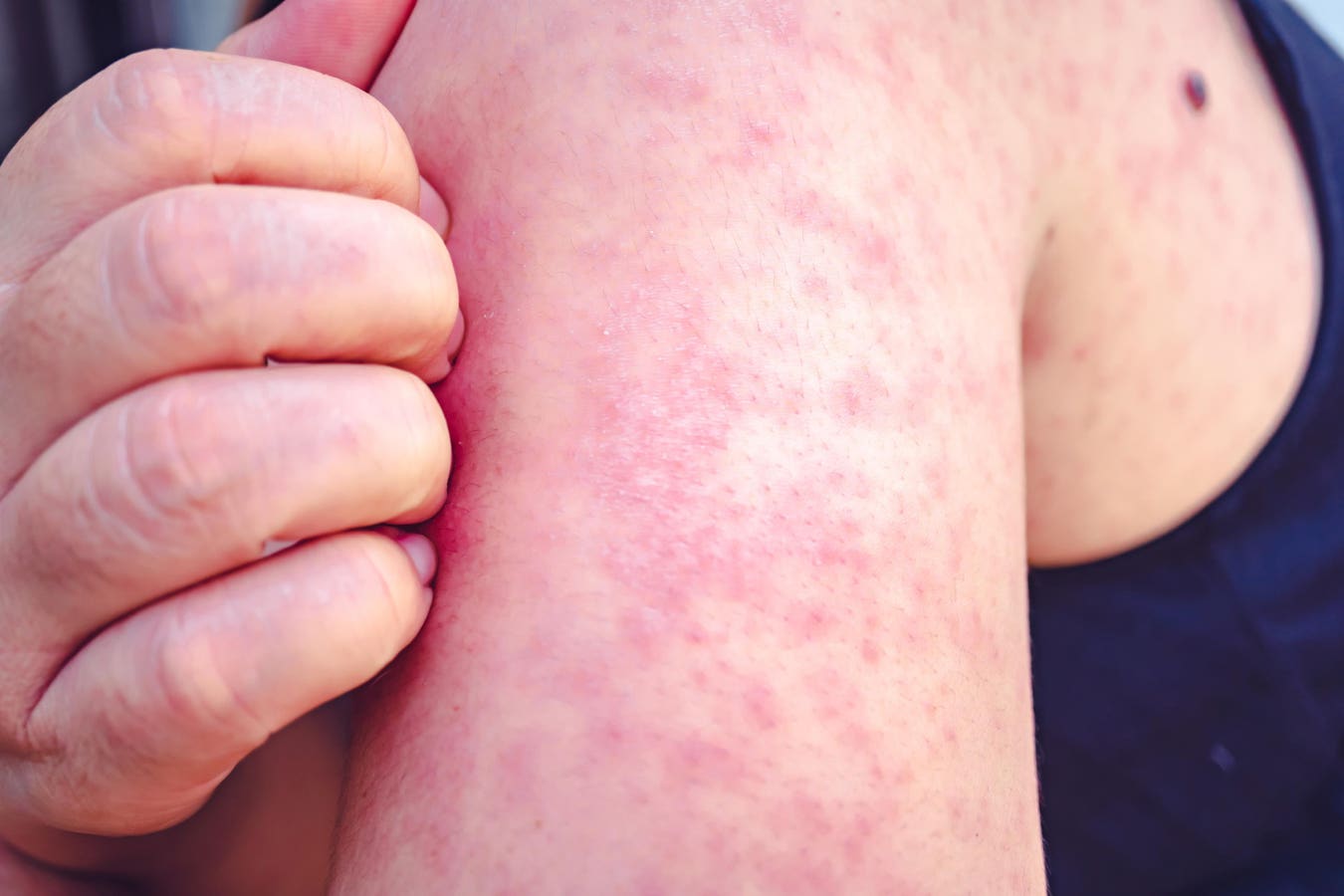
More Than 1 Million Young Brits Urged To Get Measles Vaccine
Woman scratches her upper arm with one hand due to red rash.
getty
More than 1 million young people who aren’t vaccinated against measles have been invited for catch up shots following a spike in infections in England.
Just five years ago, the country held ‘elimination’ status for the disease. Now, it’s seen hundreds of cases in just a few months.
At least 733 have been recorded since October, with the bulk of these in the West Midlands region and in London.
This is a major rise, with roughly the same number of cases being reported in all of 2022.
On Tuesday, public health system officials urged 900,000 adults aged 19 to 25 to come forward for free vaccination against the disease. And last week, 200,000 teenagers aged 16 to 19 were asked to get the shots.
The invitations are the latest phase in a major campaign that’s already seen England’s National Health Service invite more than a million children for catch-up jabs.
Although the vaccinations are normally in given in infancy and early childhood, they are still safe and effective for older children and adults.
Two doses offer very high protection against the disease, so people who missed even one shot as young kids are being invited to get them.
What is measles?
Measles is a highly infectious disease that can cause severe symptoms and even death.
It’s spread by a virus which infects the respiratory tract and other parts of the the body. Common symptoms include a rash, fever, runny nose and a cough, but the disease can be much more serious.
It can result in life-altering conditions like deafness, blindness and swelling of the brain.
It’s also dangerous for pregnant women, potentially leading to low birth weight, premature birth, and even still birth.
Steve Russell, NHS Director of Vaccinations and Screening said in a statement: “Measles is one of the most infectious diseases in the world and can cause serious harm to adults and children of all ages.”
‘Not a harmless infectious disease’
Experts fear measles outbreaks could become much worse if vaccination rates don’t improve.
Professor Beate Kampmann from the London School of Hygiene & Tropical Medicine, said in a statement that measles “is not a harmless infectious disease” and that “for every 1,000 children who get measles, one or two may die.”
Vaccination offers excellent protection against the disease. But coverage has varied significantly over the years.
“To keep cases low, 95% of the population needs to be vaccinated and unfortunately, the current coverage is well below this target,” Kampmann said. “If you want to protect your child and your community, get the vaccine.”
Dr Gayatri Amirthalingam, consultant medical epidemiologist for immunisation at the UK Health Security Agency, said getting vaccinated would protect those who can’t get the shots themselves.
“Being unvaccinated… means you risk spreading the disease to others, including those at greatest risk of becoming seriously ill — like infants, who aren’t able to receive their… vaccine until their first birthday, pregnant women and those with a weakened immune system,” she said in a statement.
Legacy of a scandal
Many of the young people invited for catch up shots would have been eligible for vaccination in the late 1990s and early 2000s, when rates started to fall in England.
At the time, fraudulent research by former doctor Andrew Wakefield was making headlines in the U.K. and beyond. A now-retracted paper in The Lancet medical journal falsely linked the mumps, measles and rubella vaccine to autism.
The paper was considered controversial even then. But it’s still thought to have had a major impact on vaccination rates.
In recent years, the Covid-19 pandemic interrupted standard childhood immunisation schedules around the world. It’s also seen the rise of a new breed of vaccine hesitancy.
Other countries — including the U.S. — are also seeing spikes in measles. At least 45 cases have reported to the Centers for Disease Control and Prevention as of February 29, per CBS News.
In the U.K., measles is surging against a background of growing health inequality and increasing levels of poverty. This is also a factor in lower vaccine coverage, according to Dr Ben Kasstan-Dabush, Assistant Professor in Medical Anthropology at LSHTM.
“Declining coverage is happening amidst an unforgiving cost of living crisis, characterised by a generational decline in living standards, political austerity and unequal pandemic recovery,” he said in a statement. “There are clear links between deprivation and lower immunisation coverage because uncertainty affects so many aspects of a parent’s life.”
Falling rates of measles vaccinations, he added, “should be taken just as seriously as vaccine programmes during the Covid-19 pandemic and resourced appropriately.”


